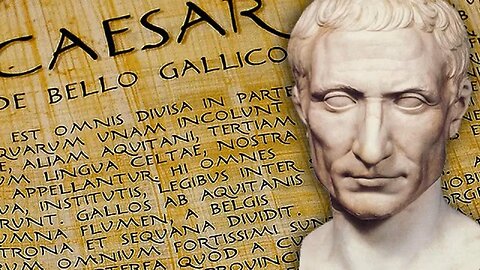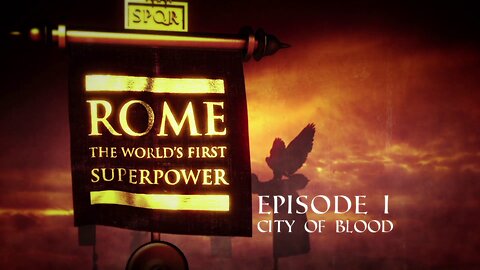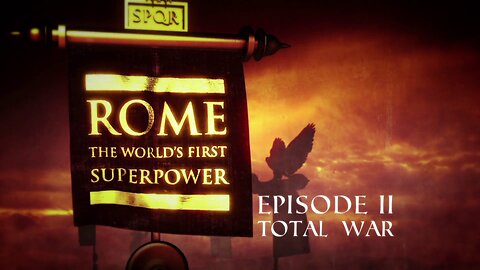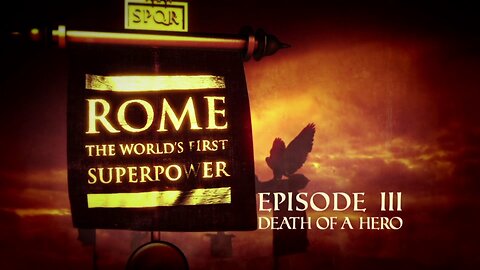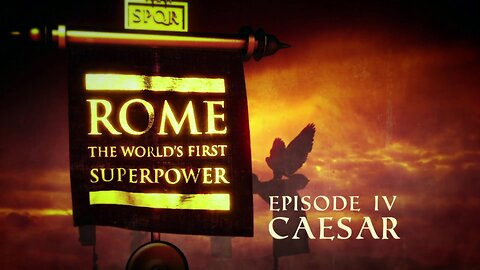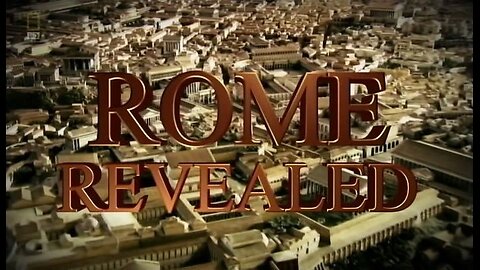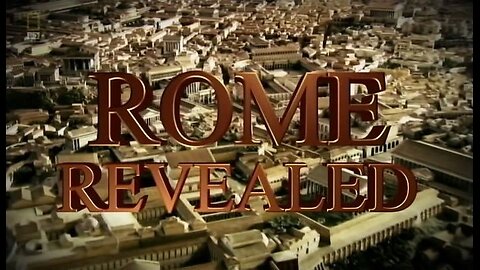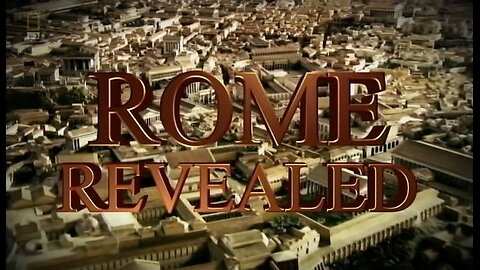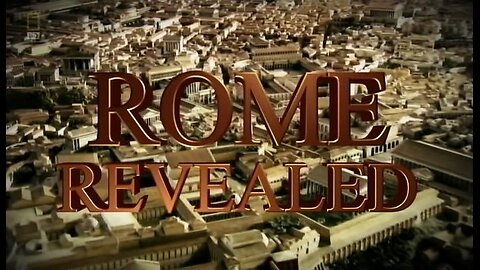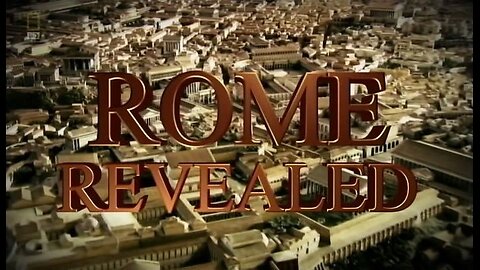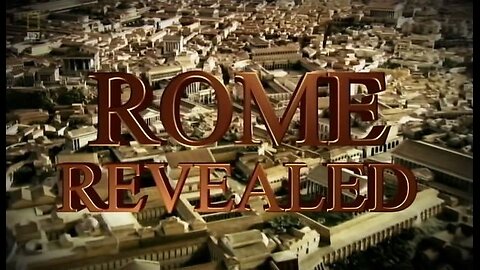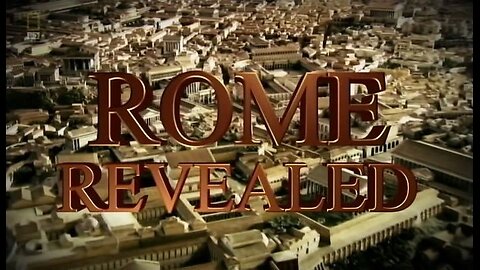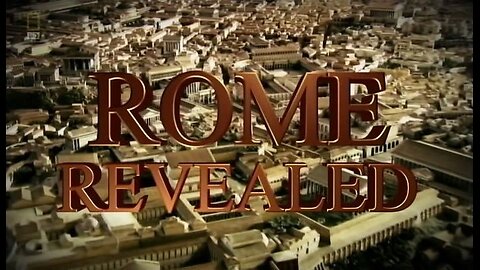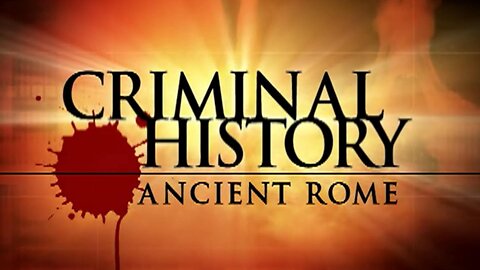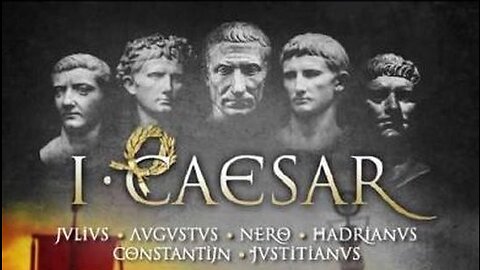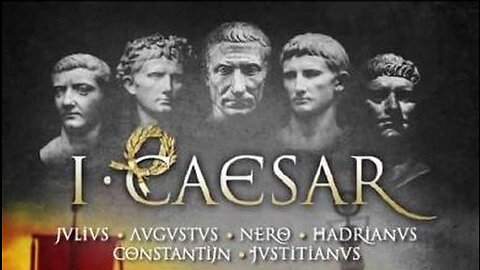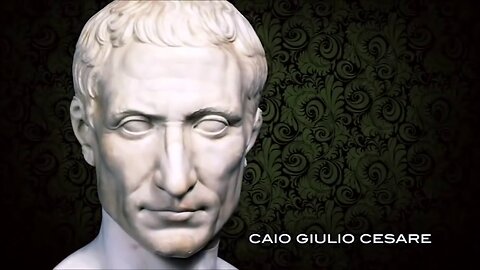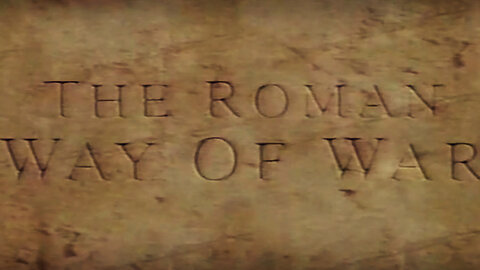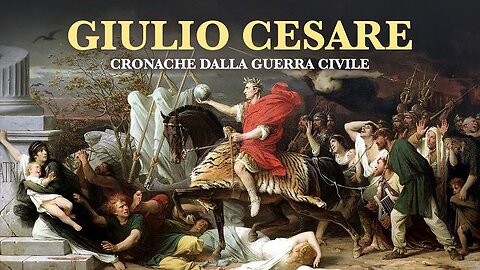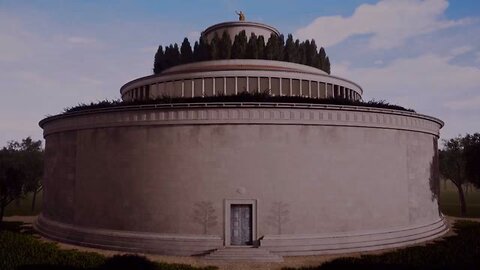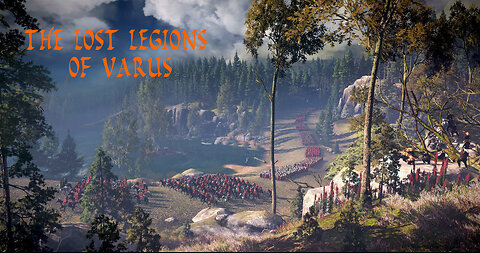Premium Only Content
This video is only available to Rumble Premium subscribers. Subscribe to
enjoy exclusive content and ad-free viewing.

Ancient Rome
AdanethHistory
- 7 / 31
2
Rome: The World's First Superpower - City of Blood (Episode 1)
Adaneth - History&Politics
A 2014 History Documentary hosted by Larry Lamb. For optional English subtitles click on CC.
On a once-in-a-lifetime journey visiting key locations, Larry sets out to discover what made the Romans so successful. He has spent years learning the Italian language while studying the history and culture of Rome, and now brings this ancient world alive with his passion, a wealth of fascinating detail and colourful CGI.
The history of Rome is a 1,000-year-long epic, filled with murder, ambition, betrayal and greed and encompassing such legendary characters as Rome’s Iron Age founders Romulus and Remus and its greatest general Julius Caesar. Larry is accompanied by some of Europe and America’s foremost classical experts who reveal the atmosphere of intrigue, conflict and violence at the places where the saga unfolded, including Rome, Pompeii, Sicily, France and Tunisia.
Episode 1: Actor Larry Lamb explores the 3,000-year-old story of the rise of the Roman Empire and how it shaped the way we live today, uncovering the intrigue, conflict, greed and violence that surrounded not only Rome, but Pompeii, Sicily, France and Tunisia as the Romans set out to conquer the world.
With the help of historians and CGI representations, Larry begins his journey by focusing on the Italian capital of Rome. He takes a look at the role of legendary characters including the city's mythical Iron Age founders Romulus and Remus, and learns how thousands of labourers turned mud huts into a city of stone.
Episode 2: https://rumble.com/v6ybyow-rome-the-worlds-first-superpower-total-war-episode-2.html
3
Rome: The World's First Superpower - Total War (Episode 2)
Adaneth - History&Politics
Episode 2: Larry Lamb reveals how the Roman Empire became the dominant power in the Mediterranean. Beginning his quest at the Roma Termini train station in central Rome, he learns how the city was attacked by the Gauls in the Battle of the Allia, fought roughly 400 years BC. The city of Rome was sacked and razed to the ground by the Gauls who also killed many of its citizens, which led to the construction of a great wall to protect the city from future raids. This three-year conflict inflicted great losses and damage. The city survived, but only just and the leaders vowed to never come so close to destruction again. The Republic soon began a century of expansion
Note: The main focus of this episode are the Punic Wars and Carthage.
Episode 3: https://rumble.com/v6ybzge-rome-the-worlds-first-superpower-death-of-a-hero-episode-3.html
4
Rome: The World's First Superpower | Death of a Hero (Episode 3)
Adaneth - History&Politics
Episode 3: During the mid-second century BC, Rome was enjoying the spoils after defeating Carthage in the Third Punic War, with slaves, treasure and art pouring into the republic. Larry Lamb examines how not everyone was reaping the benefit and reveals that resentment was mounting as the gap widened between the poor and the privileged. The actor traces the journey of Tiberius Gracchus, a man from the elite ruling classes who eventually came to champion the cause of the common citizen farmer, and learns about the development of the hypocaust, Rome's famous central-heating system.
Episode 4: https://rumble.com/v6yc0km-rome-the-worlds-first-superpower-caesar-episode-4.html
5
Rome: The World's First Superpower | Caesar (Episode 4)
Adaneth - History&Politics
Episode 4: Larry Lamb concludes his exploration of the Roman Empire by looking at the life and career of Julius Caesar. The actor traces the story of the great man's extraordinary transformation from a bankrupt junior public official to the seemingly invincible general who conquered Gaul, through to his infamous assassination in a debating chamber. Along the way, Larry discovers that money was often at the heart of the decisions Caesar made.
6
Rome Revealed: Killing Caesar (Episode 1)
Adaneth - History&Politics
A 2010 National Geographic History Documentary Series narrated by Kieran Bew.
Rome Revealed As the basis of Western civilisation, Rome is the most enduring superpower the world has ever seen. But, despite its fame, experts are still unveiling new insights into this mighty and bloodthirsty civilisation.
Using interviews and dramatic reconstructions to recreate the empire's epic history, this series takes a new look at the culture that created the modern world. Featuring the latest discoveries, we delve into every aspect of Roman life - including the bloody sporting spectacle of the gladiators in the Colosseum and the technological advances that allowed the legions to crush all opposition and conquer most of the known world.
Investigating the infamous assassination of Julius Cesar and exploring whether Caligula was really the insane tyrant history suggests, we also meet the legendary figures that shaped the course of the Eternal City. From the destruction of Pompeii to the fundamental changes brought about by the rise of Christianity, this is the real story of the world's greatest empire.
Episode 1: Find out how Julius Caesar created one of the most powerful positions in the Roman Empire using business backing, the armed forces and religion to sway elections and politicians. Eventually, the man was so powerful that the only way to stop him was through assassination.
On the eve of the 2055th anniversary of Caesar’s death, 15th March, this documentary explores how the Roman Empire had balanced the aims of great men with the shared power of a Republic for four centuries before Julius Caesar used all the instruments of state against the state itself in a bid for the biggest job in the Roman world.
Episode 2: https://rumble.com/v6w2q3a-rome-revealed-ancient-superpower-episode-2.html
Rome Revealed: Ancient Superpower (Episode 2)
Adaneth - History&Politics
Episode 2: For over 500 years, Rome could lay claim to being the centre of the world. How did one city acquire such an extraordinary wealth of power?
Episode 3: https://rumble.com/v6w2t40-rome-revealed-doomsday-pompeii-episode-3.html
8
Rome Revealed: Doomsday Pompeii (Episode 3)
Adaneth - History&Politics
Episode 3: New findings reveal stories of the everyday people caught up in one of the best-known natural disasters in history: the eruption of Vesuvius.
Episode 4: https://rumble.com/v6w2xbc-rome-revealed.-heart-of-the-empire-episode-4.html
9
Rome Revealed: Heart of the Empire (Episode 4)
Adaneth - History&Politics
Episode 4: It was the most advanced civilisation on earth, but how was Rome itself changed from swampy marsh to imperial capital?
Episode 5: https://rumble.com/v6w33di-rome-revealed-blood-in-the-sand-episode-5.html
1
comment
10
Rome Revealed: Blood in the Sand (Episode 5)
Adaneth - History&Politics
Episode 5: Archaeological evidence and eyewitness accounts recreate the Colosseum's opening night, featuring beast fights, executions and a legendary duel.
Episode 6: https://rumble.com/v6w34xs-rome-revealed-power-of-the-legion-episode-7.html
11
Rome Revealed: Power of the Legion (Episode 6)
Adaneth - History&Politics
Episode 7: Go inside the ancient war machine that was the legion army, the most deadly and disciplined force in the classical world.
12
Rome Revealed: Madness of Caligula (Episode 7)
Adaneth - History&Politics
Episode 7: Portrayed by history as a cruel madman, was Caligula really insane – or just a product of an utterly unstable world?
Episode 8: https://rumble.com/v6w3b4m-rome-revealed-christianity-rising-episode-8.html
13
Rome Revealed: Christianity Rising (Episode 8)
Adaneth - History&Politics
Episode 8: Originally viewed as a mysterious cult, find out how Christianity came to be accepted as the official religion of the Roman Empire.
14
Criminal History: Ancient Rome
Adaneth - History&Politics
A 2005 History Channel/A&E Television Networks History Documentary narrated by Dorian Harewood.
The streets of the Roman Empire were not unlike those of modern cities, where crime could be encountered around every corner. Yet, the way in which ancient Romans handled law and order was deeply embedded in the social fabric of the time. What was crime in ancient Rome? Was it defined by law or social attitudes? How did damage to the individual differ from offences against the community as a whole?
Punishment was an integral element of the Roman justice system and as controversial as it is today. From petty theft to more severe crimes, the Roman legal system was complex and multifaceted, reflecting the values and norms of Roman life. Understanding the intricate dance between crime and punishment in this era offers a window into the everyday lives and fears of ancient Romans. There was no police force but an organized group of freedmen and citizens called cohortes vigilum, The Vigiles, maintaining public order and fighting fires, Roman guards and Emperor's special protectors, the Praetorian Guard.
This one-hour documentary focuses on law and order in ancient Rome, from true-crime stories to the creation and function of various Roman law enforcement agencies.
15
I, Caesar | Julius Caesar - I am not King but Caesar (Episode 1)
Adaneth - History&Politics
A 1997 Seventh Art Production for the BBC and A&E Network Biography Documentary, written and Produced by Phil Grabsky, narrated by Brian Cox.
Its army dominated the known world. Its culture forms the heart of Western Civilization. At its zenith, the Roman Empire extended from Persia to England, the Black Sea to the Atlantic Ocean. And throughout its history, its fate rested in the hands of individuals men of genius and courage, madness and ambition. Starting with Julius Caesar, films charts the rise and fall of the Roman power over 600 years, and this classic award-winning series takes a fascinating look at the public and private lives of six key men who ruled ancient Rome: Julius Caesar, Augustus, Nero, Hadrian, Constantine and Justinian. Their careers were made up of bloody battles and tactical bribery, stunning innovation and profound corruption, dazzling rhetoric and vicious back-stabbing – and together they form a picture of the most sophisticated highs and most brutal lows of the Roman Empire's inception, heyday and final decline. Stretching at its peak, from the north of England to southern Egypt and from the west coast of Spain to Syria in the east, the Roman Empire included within its boundaries myriad people, cultures and climates. The task of ruling it seems an impossible one, even with today’s communication technology.
So how was it achieved two thousand years ago? And why has ancient Rome had such profound influence on western civilization ever since? Whether your interest is Caesar's brilliant military maneuvering, Rome's astonishing statuary and architecture or the political strategies behind imperial power, these films offer an accessible introduction to the subject. I, CAESAR spans three continents and seven centuries to tell the saga of the Roman Empire and the men who shaped it. Ancient accounts detail Nero's madness and Augustus's political brilliance. The battles of Caesar and Justinian come to life through dramatic re- enactments. Modern scholars explore Constantine's conversion to Christianity. Cutting- edge computer graphics capture the splendor of Hadrian's "golden age," and location footage from twenty-three countries shows the splendid ruins of Imperial Rome. In the riveting stories of its fabled rulers, the rise and fall of the Roman Empire comes alive. I, CAESAR takes a fresh look at the Roman Empire and shows that ancient history doesn't have to be a thing of the past.
Episode 1. Julius Caesar's ambition created a colossal empire, and he gave his name to the rulers who succeeded him. He has been a symbol of power and majesty for 2,000 years. But to his countryman, Caesar was an upstart, a gambler and a tyrant who destroyed the Roman Republic and paved the way for the rule of emperors. His reign transformed his nation and marked the beginning of the Roman Empire. His name inspires awe and admiration to this day. Julius Caesar is one of the towering figures of human history. He gave his name to the rulers that followed him, and passed down a vast empire carved from his determination and military genius. This definitive portrait uses countless ancient artifacts, texts, commentary from leading experts and dramatic re-enactments to explore his life and legacy.
Follow his meteoric rise to power and his brilliant military conquests. Hear his own descriptions of some of his greatest battles, and visit the sites of these legendary engagements. And investigate the controversy surrounding his legacy: was he an ambitious demagogue, as his detractors claim, or a defender of the people's rights against the vested powers of a controlling oligarchy? From his several wives to his storied death at the hands of Brutus, this episode proudly presents the life of Caesar.
16
I, Caesar | Augustus - First of the Emperors (Episode 2)
Adaneth - History&Politics
Episode 2: Caesar's military brilliance forged a new Rome, but it was Augustus's political genius that made it an empire for the ages. Declared emperor by the Senate, he oversaw a period of growth and prosperity marked by extraordinary artistic achievement and rapid expansion of the empire. He was heir to the greatest empire on earth but did not know it. Under his brilliant leadership, Rome was restored to unity and order after years of civil war. Augustus was Julius Caesar's grand nephew and adopted son, and unbeknownst to him, Caesar had decreed that on his death, Augustus should succeed him as Consul of Rome. In the years that followed, Augustus proved himself worthy of the choice, eventually winning total control of the Empire after defeating a challenge from Marc Antony.
This episode explores the life of the first true Roman Emperor. Discover how he was given the title by the Senate, despite always presenting himself in public at least as first citizen, not as ruler. World-renowned scholars detail his many accomplishments, including a sweeping reconstruction campaign he boasted that he "found Rome brick and left it marble." Period accounts detail his struggle to assume power, and ancient art and artifacts speak of his vast influence and legacy. From his drive to restore the morality of the empire to forging the Pax Romana, this is the saga of the first true Roman Emperor Augustus.
17
I, Caesar | Nero - The Power and the Madness (Episode 3)
Adaneth - History&Politics
Episode 3: He was seventeen when he took the throne, and during his capricious, fourteen-year rule, Nero almost brought the Empire to ruin. He was unable to quell rebellions and he had many political enemies killed. Eventually, the army rose up against him, the Senate declared him a public enemy and he committed suicide in disgrace. He was emotionally unstable, capricious and scandalous. Ironically, his troubled reign proved the strength of the Roman Empire. Nero was the last descendant of Caesar to inherit the throne.
This episode tells the twisted tale of this infamous figure. Hear ancient accounts of how he was responsible for the fire that destroyed most of Rome. Modern scholars, however, reveal how this accusation while fitting Nero's character is likely untrue, and suggest that his mistress who he later married may have been responsible for many of his legendary excesses. Discover how he scandalized the army and aristocracy by appearing in plays, and explore his bizarre relationship with his mother, whom he eventually had killed.
18
I, Caesar | Hadrian - Within These Walls (Episode 4)
Adaneth - History&Politics
Episode 4: He overturned centuries-old policies, declaring an end to expansions and abandoning far-flung territories. Hadrian was an enthusiastic patron of the arts, a champion of the common Roman and a tireless diplomat who toured the entire Empire.
He was born a thousand miles from Rome, yet became one of its most important rulers. After centuries of expansion, he decided that enough was enough.Hadrian is perhaps most famous for the wall he built across Britain. It is a fitting memorial to the emperor who declared an end to the expansionist policies of his predecessors, abandoning outlying territories and resolving to protect Rome from barbarian invaders.
This episode journeys back to Rome's Golden Age to profile the man who brought it to fruition. See how the passion for culture he learned as a youth in Greece led him to support the art lavishly. An accomplished poet, Hadrian also oversaw the construction of many of Rome's greatest monuments, including the Pantheon. But his rule was not entirely without conflict, ancient accounts suggest that he may have killed over 500,000 people putting down an insurrection in Judea. This is the definitive portrait of the man who came from the edge of the empire to oversee Rome's Golden Age, the Emperor Hadrian.
19
I, Caesar | Constantine - Bearing the Cross (Episode 5)
Adaneth - History&Politics
Episode 5: Constantine revitalised a fading empire and built a glittering new capital that would stand for over 1,000 years. But his strongest legacy is religious; his conversion to Christianity put an end to hundreds of years of persecution and laid the foundations for Medieval Europe. He re-unified and strengthened an empire on the verge of collapse. His conversion to Christianity helped lay the foundations for Medieval Europe. After Julius Caesar, Constantine the Great is arguably the most important ruler in Roman history. He took control of the Empire at one of its lowest ebbs and restored it for the final time to true glory.
This episode explores Constantine's life and legacy through ancient art and artifacts, expert commentary and historic re-enactments. Trace his 20- year struggle to take control of the splintered empire, and see how he restored it to its former glory through masterful diplomacy and the judicious use of force. Explore the dramatic story of his conversion, and the momentous changes in the Empire and the world that resulted. And walk the streets of the city he founded as the capital of his reborn empire. This is the definitive portrait of the ruler who saved his nation and transformed the world, Constantine the Great.
20
I, Caesar | Justinian - Last of the Romans (Episode 6)
Adaneth - History&Politics
Episode 6: He lived more than 500 years after Caesar. He ruled from Constantinople, not Rome. But Justinian restored the Empire to its former glory one last time. He sent his armies west, where they recaptured territory lost to Barbican invasions in the 5th century, reclaiming most of the empire. He is remembered as 'the last of the Romans'. Born a peasant, he became emperor of the Roman world. But it was an empire in decline. He spent his life trying to save it. And though he saw great victories, there were also terrible defeats. Some would call themselves emperor for another thousand years, but history remembers him as the "last of the Romans."
This episode explores the life and legacy Justinian, whose goal was to restore the glory of the ancient Roman Empire, and who nearly succeeded. Ancient accounts and dramatic re- enactments detail the campaigns that saw Italy, North Africa and Southern Spain restored to Roman rule, while experts reveal why the gains were doomed to be short lived. Justininan's vision of a centralized empire required the development of a uniform 'one state, one law, and one church' – formula. After Justinian's unsuccessful attempts to restore the Roman empire, what remained became decidedly Byzantine in aspect.
21
Catilina - Cronaca di un congiura
Adaneth - History&Politics
Un Programma RAI Speciale Storia del 2021, condotto da Cristoforo Gorno.
Lucio Sergio Catilina (in latino Lucius Sergius Catilina, Roma, 108 a.C. – Pistoia, 62 a.C.) è stato un militare e politico romano, per lo più noto per la congiura che porta il suo nome, un tentativo di sovvertire la Repubblica romana, e in particolare il potere oligarchico del Senato.
Negli ultimi anni della Repubblica, Roma presenta una scena politica particolarmente violenta. Le conquiste in Africa e in Oriente hanno sconvolto lo scenario sociale. Grandi quantità di schiavi sono affluite in Italia, provocando un crollo del costo del lavoro, l’impoverimento della classe media e lo sviluppo del latifondo. La battaglia politica tra la nobiltà, che controlla il Senato, e la plebe, che ha diritto di veto sulle leggi, si è fatta molto dura. Nel 63 a.C. questo scontro sfocia in un tentativo di colpo di stato. Il protagonista si chiama Lucio Sergio Catilina. A duemila anni di distanza, attraverso un’attenta ricostruzione dei fatti e un confronto con le fonti storiche, Cristoforo Gorno rilegge questa pagina di Storia in “Catilina, cronaca di una congiura”.
Gli storici latini definiscono Catilina intelligente e audace, ma anche ma pieno di vizi, crudele e perverso. Anche se è di origine nobile, si è più volte candidato al consolato, la massima magistratura romana, per la fazione dei populares, ma le ripetute sconfitte, causate da brogli e accuse varie, lo spingono ad organizzare una rivolta armata contro l’ordine costituito. Il suo antagonista si chiama Marco Tullio Cicerone. Viene dalla provincia, ma si è distinto nei tribunali per la sua arte oratoria e ha fatto una brillante carriera politica che lo ha portato al vertice della Repubblica come console. Anche se non è nobile, è diventato l’alfiere della fazione dei patres, l’aristocrazia senatoriale. Con le sue mosse astute, le straordinarie orazioni e la forza delle legioni, Cicerone sventa la congiura di Catilina, che trova la sua tragica fine in una battaglia senza speranza.
Cristoforo Gorno, muovendosi tra il Foro, la Curia, le Basiliche, i luoghi di Roma che fanno da palcoscenico alla storia, racconta la nascita della congiura di Catilina e il suo naufragio.
22
La Vita di Giulio Cesare
Adaneth - History&Politics
Luciano Canfora racconta Giulio Ceare.
Luciano Canfora è uno storico del mondo antico e filologo italiano, professore emerito di filologia greca e latina presso l’Università di Bari. Profondo conoscitore della cultura classica e autore di importanti studi sulla storia antica e su quella contemporanea. Membro dell’Institute for the classical tradition di Boston, della Fondazione Istituto Gramsci di Roma, e del comitato scientifico dell’Istituto della Enciclopedia Treccani, dirige la rivista Quaderni di storia e la collana La città antica e collabora con il «Corriere della Sera» e altre testate. I suoi numerosissimi studi, tradotti in varie lingue, sono caratterizzati da un approccio multidisciplinare e un ampio ambito di ricerca.
Autore di molti best seller, i suoi libri sono stati anche tradotti in diverse lingue. Tra le sue pubblicazioni: Europa gigante incatenato (Dedalo, 2020), La democrazia dei signori (Laterza, 2022), Lezioni di filologia classica (il Mulino, 2023), Sovranità limitata (Laterza, 2023), La democrazia. Storia di un’ideologia (Laterza, 2023).
Tra le sue pubblicazioni per Laterza, più volte ristampate e molte delle quali tradotte nelle principali lingue: Storia della letteratura greca; Giulio Cesare. Il dittatore democratico; Prima lezione di storia greca; La democrazia. Storia di un’ideologia;L’occhio di Zeus;Il papiro di Artemidoro; La natura del potere;I l mondo di Atene; Intervista sul potere (a cura di A. Carioti); La crisi dell’utopia. Aristofane contro Platone; Augusto figlio di Dio; Tucidide. La menzogna, la colpa, l’esilio; Cleofonte deve morire;La scopa di don Abbondio. Il moto violento della storia;Il sovversivo. Concetto Marchesi e il comunismo italiano; Fermare l’odio; La metamorfosi; Il tesoro degli Ebrei. Roma e Gerusalemme; Catilina. Una rivoluzione mancata; Sovranità limitata.
23
The Roman Way Of War
Adaneth - History&Politics
A 1998 Timewatch History Documentary known also as "The Roman Army at War", narrated by Seán Barrett.
An extraordinary monument built by the emperor Trajan, reveals highly vivid and detailed images of the Roman army at battle. Incredibly the 670 foot long column has stood at the centre of the Roman world for nearly nineteen centuries and it is only now, with the use of modern cameras, that it is possible to capture this amazing story on film.
2
comments
24
Ostia - Sulle Sponde della Storia
Adaneth - History&Politics
Un documentario del 2019 con la voce di Luca Ward.
Il documentario Ostia – Sulle sponde della storia, in onda su Sky Arte venerdì 3 gennaio, ripercorre le vicende dalla città laziale, riavvolgendo il nastro dei secoli. La storia di Ostia, sfiorata dalle onde del mare e dalle acque del Tevere, inizia quando Roma si impossessa della zona strategica della foce del fiume e vi fonda la sua prima colonia, conquistando le preziose saline etrusche e quello che diverrà il fondamentale sbocco dell’Impero sul Mediterraneo.
Crocevia di merci, popoli e culture, Ostia è il ponte fra la capitale e le sue province: inizialmente strutturata come piccolo presidio militare, sviluppa ben presto un industrioso porto fluviale a cui si aggiungeranno, in età imperiale, i grandiosi porti marittimi progettati da Claudio e da Traiano.
La vita della città si sviluppa in quasi dieci secoli, estinguendosi lentamente nella sua fase di declino:
a differenza di Pompei ed Ercolano, la cui storia si è cristallizzata con l’eruzione del Vesuvio del 79 d.C., Ostia è stata lentamente sepolta dai detriti della foce del fiume che l’hanno conservata come intatta testimonianza della vita e della società di una città romana anche nei secoli successivi.
A presentare l’arte, l’architettura e la vita quotidiana di Ostia sono gli stessi archeologi che ci lavorano ogni giorno, tanto sul fronte della tutela quanto su quello della valorizzazione, autori di studi e di scoperte che hanno rivelato una dimensione della città ben diversa da quella considerata fino a ora: le indagini più recenti hanno infatti dimostrato che quello che univa Portus, la zona dei porti imperiali, con la straordinaria necropoli di Isola Sacra e con Ostia era un sistema integrato in una sola unità urbanistica dal punto di vista ingegneristico, sociale e culturale.
25
Leptis Magna: La Roma d'Africa
Adaneth - History&Politics
Un documentario del 2010 diretto da Baudouin Koenig. Audio in Italiano.
Le rovine archeologiche in Libia, principalmente romane, sono davvero eccezionali per dimensioni e conservazione. Nel III secolo l'imperatore romano Settimio Severo, chiamato l'Africano, trasformò questa antica stazione commerciale cartaginese in una versione africana di Roma trionfante.
26
Giulio Cesare - Cronache dalla guerra civile
Adaneth - History&Politics
Un programma Rai Storia del 2022, conduce Cristoforo Gorno.
Sono le prime ore del 9 gennaio del 49 a.C. Giulio Cesare, con cinque coorti attraversa il Rubicone, il fiume che segna il confine tra la Gallia Cisalpina e il territorio di Roma, un assalto al mondo, come lo definisce lo storico Tito Livio. Ha inizio così la guerra civile tra Cesare e i conservatori del Senato, primo fra tutti Pompeo, una guerra che, allargandosi da Occidente a Oriente, assumerà i contorni di un vero e proprio conflitto globale del mondo antico mediterraneo.
27
Leptis Magna: Rome in Africa
Adaneth - History&Politics
A 2010 History Documentary, directed by Baudouin Koenig, narrated by Gil Webster.
The archaeological ruins in Libya, mainly Roman, are truly exceptional because of their size and preservation. Beyond its archaeological dimensions, Leptis Magna symbolizes the myth of Rome more than any other site.
In the 3rd Century AD, the Roman Emperor Septimus Severus, known as "the African" because he was born in Leptis Magna, turned the ancient Cathaginian trading center into a metropolis of 300,000 inhabitants. It was the third largest in the Empire, but soon was abandoned to the desert and lay covered in sand until its discovery in the 20th Century.
The excellent condition and beauty of the excavated sites conjures a vision of what the city must have been like 1700 years ago. Leptis Magna was an influential, bustling, cosmopolitan city with a prosperous port and a market which was renowned as far away as Rome. All in marble with flowing water, Leptis Magna rivaled the wealth of Rome and flaunted its power to the people of Africa.
Based on recent research by teams of Italian, German and French archaeologists, this film tells the story of mad ambition by a civilization which decided to transform a trading center into a capital city and did everything it could to succeed at making the "desert blossom."
28
I Sette Re: Le Leggenda di Roma
Adaneth - History&Politics
La fondazione di Roma, altrimenti detta Natale di Roma, è stata fissata al 21 aprile dell'anno 753 a.C., 1 AUC, dal letterato latino Varrone, sulla base dei calcoli effettuati dall'astrologo Lucio Taruzio. Altre leggende, basate su altri calcoli, indicano date diverse.
La data di fondazione di Roma nell’anno 753 a.C. è quella più comunemente accettata, a prescindere da come fosse denominata o se si trattasse di un nucleo urbano o di un’area occupata da vari villaggi. Che la prima forma di organizzazione politica dell’area fosse di tipo monarchico è confermato dai reperti archeologici e dalle fonti classiche. Negli scavi emersi nella Regia (la casa dove viveva il re) del Foro Romano, fu trovato un vaso di bucchero della fine del VII secolo a.C. con apposta l’iscrizione “Rex”. Inoltre si trova la parola “regei” sulla Lapis Niger, il cippo del Foro Romano con l'iscrizione della legge sacra. Si può inoltre dedurre l’antichità della monarchia da altre iscrizioni rinvenute nel territorio, come quella del rex nemorensis (re del bosco), ovvero il sacerdote che si occupava della cura dei boschi dedicati a Diana (dal VI secolo a.C. all’epoca dell’Impero). La tradizione afferma che il primo re fu Romolo, il figlio di Marte che diede a Roma le sue primitive normative politiche.
Gli antichi Romani hanno elaborato un complesso racconto mitologico sulle origini della città e dello stato; il racconto ci è giunto con le opere storiche di Tito Livio, Dionigi di Alicarnasso, Plutarco e le opere poetiche di Virgilio e Ovidio, quasi tutti vissuti nell'età augustea. In quest'epoca le leggende, riprese da testi più antichi, vengono rimaneggiate e fuse in un racconto unitario, nel quale il passato viene interpretato in funzione delle vicende del presente. I moderni studi archeologici, che si basano su queste e su altre fonti scritte, nonché sugli oggetti e sui resti di costruzioni rinvenuti in vari momenti negli scavi, tentano di ricostruire la realtà storica che sta dietro il racconto mitico, nel quale man mano si sono andati riconoscendo elementi di verità. Secondo la storiografia moderna, Roma non fu fondata con un atto volontario ma, come altri centri coevi dell'Italia centrale, dalla progressiva riunione di villaggi.
L’elenco canonico dei sette re di Roma (otto se si aggiunge Tito Tazio) è il seguente: Romolo, Numa Pompilio, Tullio Ostilio, Anco Marzio, Lucio Tarquinio Prisco, Servio Tullio e Tarquinio il Superbo. Nessuno storico, attualmente, mette in dubbio l’esistenza degli ultimi tre re, grazie alla documentazione archeologica che conferma le informazioni fornite dalle fonti letterarie. D’altra parte, non ci sono documenti che possano negare l’esistenza dei restanti quattro.
Parte della storiografia contemporanea sostiene che l’elenco dei sette re già esisteva quando i primi storici romani, nel III secolo a.C., scrissero i propri testi sull’origine di Roma, confermando la loro reale esistenza.
29
Ulisse: il piacere della scoperta | Le sette meraviglie della Roma imperiale
Adaneth - History&Politics
In questa puntata Alberto Angela celebra il Natale di Roma accompagnando i telespettatori in un affascinante viaggio tra le meraviglie della Roma imperiale: la Roma dei Cesari. Partendo dal Mausoleo di Augusto - appena riaperto al pubblico dopo un restauro durato 14 anni - ripercorriamo le tappe fondamentali che caratterizzarono la nascita e l'espansione di uno dei più grandi imperi di tutti i tempi e scopriamo come e perché la città di Roma in quel periodo raggiunse il suo massimo splendore.
30
The Lost Legions of Varus
Adaneth - History&Politics
A 2001 Channel 4 History Documentary narrated by Jim Carter.
In the autumn of 9 AD Roman forces occupying Northern Germany were lured into a death trap. Over 20,000 of the world's most feared troops, their families, even their animals, were slaughtered by Iron Age tribes. The bloody massacre defined forever the limits of Roman expansion and left Europe fatefully divided, yet for almost 2,000 years the exact site of this disaster was only guessed at. Then, in 1987, a British soldier made a find that suggested the true whereabouts of the 'Battle of Teutoburg'. Today a grim picture of deception, ambush and ritual slaughter is beginning to emerge.
The Lost Legions of Varus explores the flaws in Roman imperial policy, as well as the fralities of the human condition – factors both relevant in understanding the reasons behind the massacre in the Teutoberg forest.
Historian and experts appearing in this film are: Dr. Frank Berger (Coin Specialist), Major Tony Clunn, Birgit Großkopf (Forensic Anthropologist), Professor Malcolm Todd, Professor Siegmar von Schnurbein, Dr. Susanne Wilbers-Rost, Derek Williams (Writer and Historian).
2
comments
31
Pompeii: Disaster Street
Adaneth - History&Politics
A 2020 Gedeon History Documentary with English narration. For English subtitles click on CC icon.
For the first time in 70 years, archaeologists have uncovered new areas of ancient Pompeii. With exclusive access to the dig, see how the latest artifacts and DNA science are changing history and discover the real stories of what happened to the unfortunate souls who didn’t escape to the city gates.
Rome Revealed: Ancient Superpower (Episode 2)
2 months ago
122
Episode 2: For over 500 years, Rome could lay claim to being the centre of the world. How did one city acquire such an extraordinary wealth of power?
Episode 3: https://rumble.com/v6w2t40-rome-revealed-doomsday-pompeii-episode-3.html
Loading comments...
-
 54:38
54:38
Adaneth - History&Politics
5 days agoJapan: End of an Empire
52 -
 3:32:18
3:32:18
Mally_Mouse
10 hours ago🌶️ 🥵Spicy BITE Saturday!! 🥵🌶️- Let's Play: Phasmophobia
46.5K5 -
 1:13:19
1:13:19
iCkEdMeL
6 hours ago $17.48 earnedChaos Explodes in Chicago & Portland | Feds Clash with Protesters!
44.3K14 -
 21:54
21:54
Exploring With Nug
1 day ago $9.95 earnedScuba Diving Missing Person Search Leads to Discovery of Classic Cars!
61.2K12 -
 8:06:32
8:06:32
Phyxicx
11 hours agoStar Wars: Movie Battles II Community Event hosted by ReaperAF95 - 10/4/2025
27.9K -
 1:19:51
1:19:51
World2Briggs
9 hours ago $2.61 earnedThe US This Week
33.9K7 -
 2:31:13
2:31:13
Joker Effect
6 hours ago"MAKE STREAMING GREAT AGAIN" - Brands Step Up Finally. Birth of Rumble Community. Taking Leadership
20.4K2 -
 5:02:17
5:02:17
Illyes Jr Gaming
10 hours ago"Machine Gun" Takes On BLACK OPS 7 Beta DAY 3!!!
13.2K1 -
 2:57:29
2:57:29
Damysus Gaming
7 hours agoBorderlands 4 - AMON Vs Timekeeper!! Lets Grind This OUT!!
11.6K -
 3:10:06
3:10:06
Nikko Ortiz
13 hours agoHAMAS Gaza Peace Deal And MORE.... Brutally Honest EP #17 | Rumble LIVE
116K67
